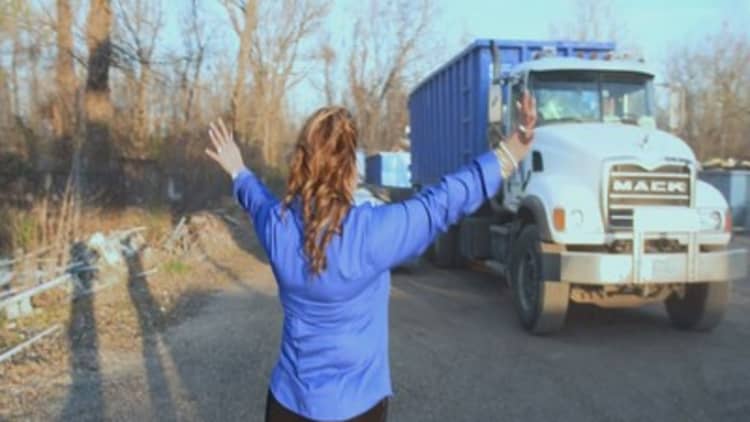
Maria Rios was born into what can be described as relative affluence for the small town of Mogotillo, El Salvador.
Her parents, Juan Angel and Reyna Romero, were in farming and ranching—better off than most in the community. "I remember my mother sewing school uniforms for the employees' children and my father buying books for the local kids," Rios recalled.
The life of affluence that Maria knew as a child, however, would soon vanish, as a civil war between rebels and a repressive military regime forced the family to flee El Salvador.
"When I was around 12, I started seeing and hearing things in the news about war and killing and kidnappings," Rios said. "Many people were leaving to escape the violence, and my parents—without telling me or my two older sisters—decided it was time to go."
In the summer of 1980, the family left their war-torn home on a "vacation" to visit friends in the U.S. Not able to sell their farm or equipment amid the intensifying conflict, they took what money they had and set up a simple life in a small two-bedroom house on the north side of Houston. With no work history and a limited use of English, Maria's mother and father didn't have many work options, so they got jobs cleaning offices.
"We lived on a very strict budget," Rios said. "My mom took us to thrift stores. I remember wanting a dress, but my mother said we couldn't buy it because we needed money to buy groceries."
During the summers, Maria would join her mother on the job. "They were high-rise buildings, and I'd sit down in the fanciest offices and pretend that one day I'll be sitting down like this in my own office with my own business."
In a whiff of garbage, the scent of big money
The family's reduced circumstances—and Rios' marriage at age 18—didn't stop her from accomplishing the most important goal on the way to success. "My parents raised me to get an education first and foremost. That was something that was ingrained in my sisters and I."
In fact, a job she found to help fund her education would ultimately become her $30 million trash empire.
"I had a friend who was working for Western Waste Industries, and she said there were many opportunities in that field, so I decided to give it a try. As it turned out, since the majority of the drivers were Spanish-speaking and I spoke both English and Spanish, I became incredibly handy," Rios said.
Within three years, Rios rose through the ranks—from phone to dispatch to the accounting department and eventually to the environmental department, where she managed higher-cost and higher-risk materials. And throughout college and the births of her three children, she never stopped working.
"I was young and ambitious. I wanted to climb the ladder as fast as I could," Rios said, reflecting on a relentless work ethic she attributes to her father.
"This was the absolute challenge—to balance work ambition with raising a family and going to school, all at the same time," she said.
In 1997, Maria graduated from the University of Houston with a BA in business and was determined to put her degree to work and venture out on her own. "Maybe I could have obtained some higher position with a larger salary, but I wanted a business with endless potential, which is what I saw in this trash business."
She noticed that small companies and minorities were not priorities of the existing players in the waste-management space, offering both a business opportunity and an opportunity to service her community.
Rios said her father taught her that you can't accomplish anything by yourself. "Faith, family and community" is what Rios remembers her father saying most often. "It all goes back to the lessons I learned on our farm about running a smart business and paying it forward. If you practice what you preach and give back to your community, you will be enriched and rewarded."
Read MoreBlue Collar Millionaires: The $20 million king of concrete
Her husband, who worked in maintenance, didn't embrace the idea of becoming a business owner at first. "It was a big risk, and he just wanted the security of bringing home a paycheck," Rios said.
Rios wanted more. She set her sights on two trucks and took her business plan to a bank, hoping for a credit line of $250,000, which she received, and used it to purchase her first two trucks and launch her company Nation Waste, now valued at $30 million.
Rios began by soliciting small businesses and minority customers and slowly started to build her business. "In the beginning, I made enough to pay my bills and a small profit, but I kept reinvesting it into the company," she said.
In August 2005, when Hurricane Katrina hit Texas, Rios saw it as an opportunity to again profitably link business to community. She provided services at reduced rates to families and businesses who might not otherwise have been able to afford it. As word spread of her generosity, the Nation Waste brand grew: Business more than doubled between 2005 and 2010. Those initial two trucks became 21 trucks, and Nation Waste expanded to four business units, from compactors and balers to include recycling and portable toilet divisions. Currently, Nation Waste is up to 26 trucks (two more on order) and 41 employees.
"Whoever would have thought that a little girl coming to America from El Salvador could achieve a dream that is purely American," Rios said. "Perseverance will pay off; I am living proof."
Tune in Wednesday night, July 22, at 10 p.m. for "Blue Collar Millionaires" on CNBC.


